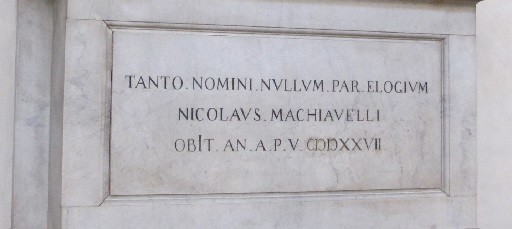Imagine a person so revered his tombstone has these words inscribed on it: “To so great a name, no epitaph can do justice.” Do you think this phrase could be put above W’s grave? How about Clinton’s? Obama’s? How about Nixon’s? Would you believe this is what is written on the gravestone of the infamous Niccolò Machiavelli? I say infamous because an adjective is derived from his name – Machiavellian – it describes an unscrupulous person. The English have an expression for the devil – ‘Old Nick,’ which is derived from their very black opinion of Machiavelli. A person or politician who is Machiavellian is: ‘cunning, dishonest, duplicitous, opportunistic, looks askance of morality in personal life.’ I guess today’s politicians have not evolved very much. If we look at past political leaders you certainly could ascribe more than one of these attributes to them.
Niccolò di Bernardo dei Machiavelli was born on May 5, 1469 in Florence, Italy. Machiavelli earned the distinguished epitaph on his gravestone for his devotion to the service of Florence, for which he was not duly compensated throughout his life. He never became rich in spite of his dedication. During his 58 years on earth (he died in 1527) Machiavelli was a statesman, politician, poet, novelist, and a translator of classical works as well as a playwright. However, he is best known around the world for his work ‘The Prince,’ which is based on the behavior and actions he observed while serving Duke Cesare Borgia.
He liked what he saw, so in 1513 Machiavelli wrote this treatise on political advice for present and future monarchs. From then on Machiavelli and politics are inseparable. His work is deemed a politician’s how-to manual and therefore he is considered the father of modern political science. The truth hurts, so his book did not garner him much love in his lifetime. He made many enemies and at one point was tortured with the strappado.
Torture using the strappado is very painful. A person’s wrists are tied behind his back and then he is hoisted into the air. This method usually dislocates the shoulders, tears muscles and you are left with two useless appendages. The witches in Salem, Massachusettes, were subjected to the strappado in an effort to get them to confess they were witches, but they had nothing to confess; neither did Machiavelli. He was accused of being part of a conspiracy to murder Giuliano de Medici. Believe it or not, Machiavelli survived the strappado. He was thrown in prison and decided to write Giuliano a pair of sonnets in an effort to be exonerated. Machiavelli called these poems the “Magnificant Giuliano.” It worked.
Niccolò Machiavelli believed all people are motivated by their desires and their fears, especially politicians. Upon close observation of Cesare Borgia’s actions, he determined that it is how you deal with your desires and fears that creates the type of politician one becomes. Since the 16th century, politicians have used the recommendations in The Prince as their playbook, whether they knew it or not. With the invention of the printing press only a few decades before publication, ‘The Prince’ was widely distributed across Europe. The Church and political leaders of the time had very harsh opinion of Machiavelli –thus the word Machiavellian – but if you are a student of history you will see his truths surfacing during every century since his words were written.
Let’s have some fun and see what Machiavelli would say to President Obama and to the field of candidates for the US presidential election. To President Obama he might have said during his run for the Presidency: “For a leader to be naïve or credulous can be dangerous, even fatal,” and remember, Barry, “when choosing your cabinet, that the first method for estimating the intelligence of a ruler is to look at the men he has around him.”
To the dwindling field of candidates he would recommend many things. To Bernie Sanders, who proposes a very socialist agenda Niccolò would be prompted to make the following comment: “There is nothing more difficult to take in hand, more perilous to conduct or more uncertain in its success, than to take the lead in the introduction of a new order.”
To Trump: “Where the willingness is great, the difficulties cannot be great. To understand the nature of the people, one must be a prince and to understand a prince one must be of the people.”
To Cruz, who tried to sabotage Carson: “I know the end justifies the means” but do you not understand that “one change always leaves the way open for the establishment of others.”
So relevant, don’t you think? Perhaps the Republican Party and the Democratic Party can send each candidate a gift – the book ‘The Prince.’ It couldn’t possibly hurt.

